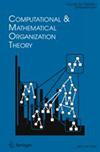监控资本主义还是民主?信息文明中的制度秩序与知识政治的死战
IF 1.5
4区 管理学
Q3 COMPUTER SCIENCE, INTERDISCIPLINARY APPLICATIONS
Computational and Mathematical Organization Theory
Pub Date : 2022-07-01
DOI:10.1177/26317877221129290
引用次数: 8
摘要
监视资本主义是美国民主制度退出时发生的事情。二十年后,它未能通过对数字信息和通信负责任的全球管理的任何合理测试。将世界信息空间拱手让给监视资本主义,已成为每个共和国的元危机,因为它阻碍了所有其他危机的解决。监控资本主义巨头——谷歌、苹果、Facebook、亚马逊、微软和它们的生态系统——现在构成了一种席卷全球的政治经济制度秩序,对大多数数字信息和通信空间、系统和过程施加寡头垄断控制。在秘密大规模提取人类生成的数据中,人类行为的商品化是监控资本主义二十年制度发展的基础。然而,当收入来自人的商品化时,经典的经济方程式就被打乱了。命令性经济运行增加了治理功能,造成了巨大的社会危害。经济权力的集中导致治理和社会权力的附带集中。经济领域的寡头垄断逐渐演变为社会领域的寡头统治。社会对这些发展作出反应的能力受到类别错误的阻碍。治理入侵和社会危害,如对人工智能的控制或猖獗的虚假信息,往往被视为不同的危机和孤立的危机,每个危机都有自己的专家和处方,而不是被理解为因果经济运行的有机影响。相比之下,本文将监控资本主义作为一个统一的制度发展领域进行探讨。通过20年来不断扩大的经济运作及其社会影响来审视人工智能的四个已经可见的发展阶段,包括对隐私的提取和大规模破坏、人与人之间沟通中设计盲目性的后果、人工智能主导地位的崛起和认知不平等、远程行为驱动方面的新成就,比如特朗普2016年的竞选活动、以及苹果和谷歌利用数字基础设施控制来征服渴望抗击流行病的民主政府。从结构上讲,每个阶段都为下一个阶段创造条件并搭建脚手架,每个阶段都以前一个阶段为基础。从本质上讲,每个阶段都以三个成就载体为特征:新的经济运作、治理剥离和新的社会危害。这三个维度在制度发展的统一架构中交织在一起。后期危害表现为人类商品化所必需的基础阶段经济运作的影响。监控资本主义的发展是在与民主秩序的更大竞争的背景下理解的——民主秩序是唯一构成生存威胁的竞争性制度秩序。民主秩序保留了反驳、中断和废除监视资本主义基本运作的合法权力。它的独特优势包括激励行动的能力,以及制定、实施和执行法治的必要权力。虽然自由民主国家已经开始应对监管当今私人拥有的信息空间的挑战,但我认为,对制度化进程的监管对民主社会来说是天生的灾难,无法产生预期的结果。统一场域视角表明,旨在消除后期危害(如“虚假信息”)的有效民主矛盾,依赖于对早期经济运作的废除和重新发明,这些经济运作使人类商品化,这是这些危害的来源。制度秩序的冲突是数字世纪知识政治的一场死亡竞赛。监视资本主义的反民主经济必要性产生了一种零和动态,在这种动态中,监视资本主义的深化秩序传播了民主的无序和去制度化。如果没有新的公共机构、权利宪章和专门为民主数字世纪而建立的法律框架,公民就会赤身裸体,很容易成为所有窃取和利用人类数据的人的猎物。在这些相互竞争的秩序中,只有一种会以统治的权威和力量出现,而另一种则会逐渐走向去制度化,其功能被胜利者所吸收。这些矛盾最终会击败监视资本主义,还是民主会遭受更大的伤害?监控资本主义是可能的,民主也是可能的。两者不可能兼得。本文章由计算机程序翻译,如有差异,请以英文原文为准。
Surveillance Capitalism or Democracy? The Death Match of Institutional Orders and the Politics of Knowledge in Our Information Civilization
Surveillance capitalism is what happened when US democracy stood down. Two decades later, it fails any reasonable test of responsible global stewardship of digital information and communications. The abdication of the world’s information spaces to surveillance capitalism has become the meta-crisis of every republic because it obstructs solutions to all other crises. The surveillance capitalist giants–Google, Apple, Facebook, Amazon, Microsoft, and their ecosystems–now constitute a sweeping political-economic institutional order that exerts oligopolistic control over most digital information and communication spaces, systems, and processes. The commodification of human behavior operationalized in the secret massive-scale extraction of human-generated data is the foundation of surveillance capitalism’s two-decade arc of institutional development. However, when revenue derives from commodification of the human, the classic economic equation is scrambled. Imperative economic operations entail accretions of governance functions and impose substantial social harms. Concentration of economic power produces collateral concentrations of governance and social powers. Oligopoly in the economic realm shades into oligarchy in the societal realm. Society’s ability to respond to these developments is thwarted by category errors. Governance incursions and social harms such as control over AI or rampant disinformation are too frequently seen as distinct crises and siloed, each with its own specialists and prescriptions, rather than understood as organic effects of causal economic operations. In contrast, this paper explores surveillance capitalism as a unified field of institutional development. Its four already visible stages of development are examined through a two-decade lens on expanding economic operations and their societal effects, including extraction and the wholesale destruction of privacy, the consequences of blindness-by-design in human-to-human communications, the rise of AI dominance and epistemic inequality, novel achievements in remote behavioral actuation such as the Trump 2016 campaign, and Apple-Google’s leverage of digital infrastructure control to subjugate democratic governments desperate to fight a pandemic. Structurally, each stage creates the conditions and constructs the scaffolding for the next, and each builds on what went before. Substantively, each stage is characterized by three vectors of accomplishment: novel economic operations, governance carve-outs, and fresh social harms. These three dimensions weave together across time in a unified architecture of institutional development. Later-stage harms are revealed as effects of the foundational-stage economic operations required for commodification of the human. Surveillance capitalism’s development is understood in the context of a larger contest with the democratic order—the only competing institutional order that poses an existential threat. The democratic order retains the legitimate authority to contradict, interrupt, and abolish surveillance capitalism’s foundational operations. Its unique advantages include the ability to inspire action and the necessary power to make, impose, and enforce the rule of law. While the liberal democracies have begun to engage with the challenges of regulating today’s privately owned information spaces, I argue that regulation of institutionalized processes that are innately catastrophic for democratic societies cannot produce desired outcomes. The unified field perspective suggests that effective democratic contradiction aimed at eliminating later-stage harms, such as “disinformation,” depends upon the abolition and reinvention of the early-stage economic operations that operationalize the commodification of the human, the source from which such harms originate. The clash of institutional orders is a death match over the politics of knowledge in the digital century. Surveillance capitalism’s antidemocratic economic imperatives produce a zero-sum dynamic in which the deepening order of surveillance capitalism propagates democratic disorder and deinstitutionalization. Without new public institutions, charters of rights, and legal frameworks purpose-built for a democratic digital century, citizens march naked, easy prey for all who steal and hunt with human data. Only one of these contesting orders will emerge with the authority and power to rule, while the other will drift into deinstitutionalization, its functions absorbed by the victor. Will these contradictions ultimately defeat surveillance capitalism, or will democracy suffer the greater injury? It is possible to have surveillance capitalism, and it is possible to have a democracy. It is not possible to have both.
求助全文
通过发布文献求助,成功后即可免费获取论文全文。
去求助
来源期刊

Computational and Mathematical Organization Theory
COMPUTER SCIENCE, INTERDISCIPLINARY APPLICATIONS-MATHEMATICS, INTERDISCIPLINARY APPLICATIONS
CiteScore
3.80
自引率
16.70%
发文量
14
审稿时长
>12 weeks
期刊介绍:
Computational and Mathematical Organization Theory provides an international forum for interdisciplinary research that combines computation, organizations and society. The goal is to advance the state of science in formal reasoning, analysis, and system building drawing on and encouraging advances in areas at the confluence of social networks, artificial intelligence, complexity, machine learning, sociology, business, political science, economics, and operations research. The papers in this journal will lead to the development of newtheories that explain and predict the behaviour of complex adaptive systems, new computational models and technologies that are responsible to society, business, policy, and law, new methods for integrating data, computational models, analysis and visualization techniques.
Various types of papers and underlying research are welcome. Papers presenting, validating, or applying models and/or computational techniques, new algorithms, dynamic metrics for networks and complex systems and papers comparing, contrasting and docking computational models are strongly encouraged. Both applied and theoretical work is strongly encouraged. The editors encourage theoretical research on fundamental principles of social behaviour such as coordination, cooperation, evolution, and destabilization. The editors encourage applied research representing actual organizational or policy problems that can be addressed using computational tools. Work related to fundamental concepts, corporate, military or intelligence issues are welcome.
 求助内容:
求助内容: 应助结果提醒方式:
应助结果提醒方式:


